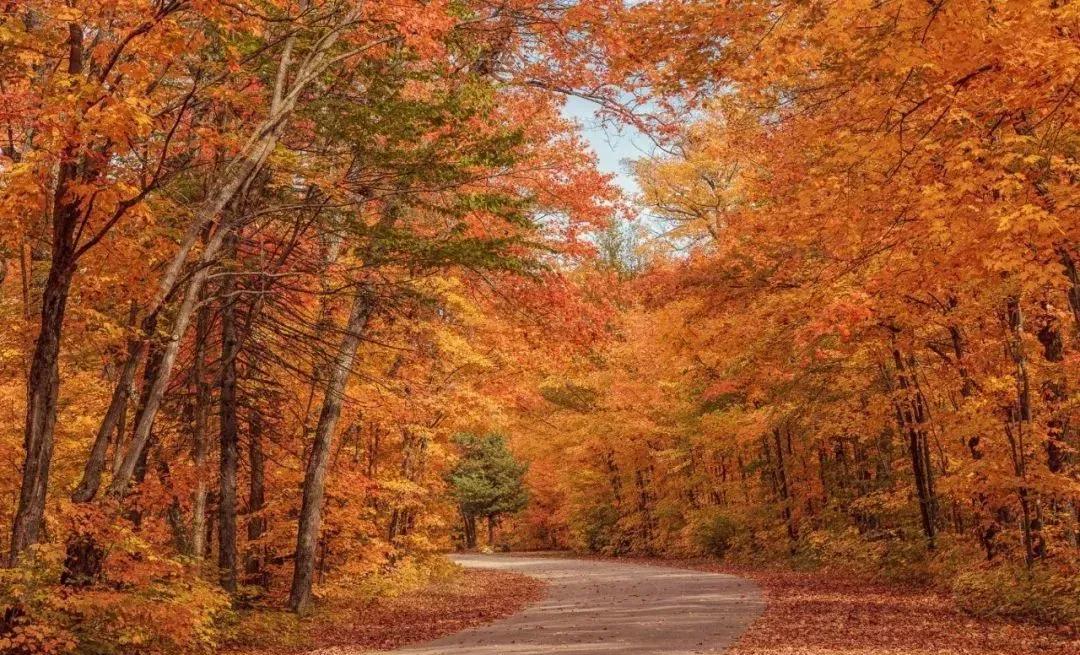There is a small park opposite the home, whenever it comes to this season, from the window, the forest is full of colors, the first time, the poem that comes to mind is Qiu Fengjia's sentence "Lin Feng wants the old persimmon to ripen, autumn is red in the depths of the Wanshan Mountains", not other.

The ultimate of poetry is probably "natural to carve", to achieve the realm of "instant scenery will meet the heart": straight to the object in front of the book, directly express the inner feelings, and integrate the two into one. Directly use your own senses, that is, use intuition to directly present the scene, the scenery and the emotion are integrated, and there is no need to use language to make additional interpretations and decorations, which can impress the reader. The so-called "article is natural, clever hands are even" refers to this situation.
The Book of Verses reads, "Once upon a time, I was in the past, and Yang Liuyi was yiyi." Today I come to think, rain and snow fei fei", Xie Lingyun "pond spring grass", Cao Zhi "gaotai more autumn wind", Li Bai "bright moon out of the heavenly mountains", Du Fu "stars hanging flat and wide", Yan Wei "liutang spring water, flower dock sunset late", Du Xunhe "wind warm birds sound broken, the sun high flower shadow heavy", Wang Wei "the desert is lonely and straight, the long river sunset is round" and so on, most of them are like this. The ancients cloud "cover with the scenery to write freehand, the scenery is subtle, the author's ultimate also", the more they use the most superficial language, write the most natural scenery, the most rare.
After the Tang and Song dynasties, the more skills there were and the fewer masterpieces. And Qiu Fengjia's sentence "Lin Feng wants the old persimmon to ripen, and autumn is red in the depths of the Ten Thousand Mountains", which is also a sentence that is clumsy, shallow and profound, out of the blue, straight to the heart, not vain, is a sentence that I will never forget when I look at it. Verses are the eyes of the foreground, how to forget?
"Mountain Village is Eye" Part II
(Late Qing) Qiu Fengjia
In the sunset of the west wind in a corner, the rain on the east ridge of the broken clouds is thick.
Lin Feng wants the old persimmon to ripen, and the autumn is red in the depths of the Wanshan Mountains.
Appreciation:
Qiu Fengjia (1864-1912), a native of Miaoli County, Taiwan Province, was a patriotic poet, educator, and anti-Japanese defender of Taiwan in the late Qing Dynasty.
Many years ago, I traveled to Taiwan, I stayed in Taichung for one night, There is Fengjia University in Taichung City, and I have also visited Fengjia Night Market, which shows the influence of Qiu Fengjia among Taiwanese.
Qiu Fengjia said:
A corner of the corner tower, bathed in the setting sun, the autumn wind blowing;
In the distance, the towering East Ridge is raining heavily.
The maple leaves in the mountain forest are becoming redder and redder,
Persimmons are also about to ripen and turn red.
Where is autumn?
Autumn is in the midst of the autumn leaves of countless hills.
"Lin Feng wants the old persimmon to ripen", the crimson maple leaves and the red ripe persimmons point out the season with the most typical two scenes. This sentence has no color, and then the reader's eyes can immediately appear bright colors. It is also the author's expectation and vision of the autumn harvest season.
"Autumn is red in the depths of the Ten Thousand Mountains", is to ascend to the distance, the mountains are bright red, the layers of forests are dyed, a magnificent scenery, like a landscape painting, directly displayed in the reader's mind. Autumn is the season, an abstract concept, but the poet embodies autumn and borrows autumn from the colors of autumn leaves and ripe fruits. And "red" is not only a color, it seems to have the magic of time, the mountains from verdant to full of red, is the picture of fast-forward time.
There used to be a children's song "Spring Is There":
Where is spring?
Where is Spring?
Spring is in that verdant mountain forest.
There are safflowers here.
There's green grass here,
And the little yellow oriole that can sing.
I used to think it was very subtle, but now I find that it is actually long-winded, compared to the sentence "Autumn is red in the depths of the Ten Thousand Mountains", it is weak and explosive!